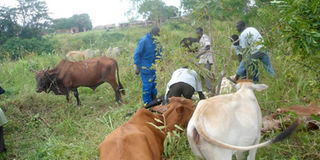Cattle disease leaves Namutumba broke

Affected. Herders look after their cattle. Cattle keepers in Namutumba District are registering losses because of the quarantine. FILE PHOTO
What you need to know:
- The ban on sale of animals and their products in Namutumba District has left sub-counties hit by foot and mouth disease with out revenue.
- Mr Wilber Maka, a cattle trader in Bulange Sub-county, said meat prices will continue to soar unless the ban is rolled back.
The ban on sale of animals and their products in Namutumba District has left sub-counties hit by foot and mouth disease with out revenue.
The contagious viral disease has also forced upwards the prices of animal products.
The disease was first reported in September 2017 in Bulange and Namutumba sub-counties, leaving more than 100 animals dead, forcing the Ministry of Agriculture, Animal Industry to issue a ban.
The Namutumba Rural Sub-county chairperson, Mr George Lubera, says before the ministry imposed the quarantine, he used to have 30 meat-selling points in the area and was collecting Shs150,000 per day in local revenue.
But he says the butchers have now been reduced to only 15 due to shortage of animals for slaughtering.
Reduction of revenue
“Every month, my sub-county accountant used to acknowledge Shs4.5m in revenue collection but the amount has reduced to only Shs50,000 per month,’’ he adds.
“Apart from decline in local revenue collection, the prices of meat and animal products, including hides and skins, has increased, which is affecting the business community.’’
Mr Wilber Maka, a cattle trader in Bulange Sub-county, said meat prices will continue to soar unless the ban is rolled back.
The Bulange Sub-county chairman, Mr Yakut Kasoma, said his daily earnings from the sale of beef and other cattle products that stood at Shs200,000 before the quarantine was now down to only Shs120,000 per day.
“If local revenue from the Sub-counties, which make up the district reduces, the entire revenue for the district also reduces, causing a disservice to the locals,” he said.
Appeal
“However, we are requesting the authorities to submit reports to the ministry to lift the quarantine. Much as we are not experts or veterinary doctors, we see a reduction in the spread of animal diseases compared to last year,’’ he added.
The Magada Sub-county chairperson, Mr Mathias Kwagala, said before the disease broke out in his sub-county, the local revenue collection from the slaughter of animals was at 100 per cent but has now reduced to only 50 per cent.
The district veterinary officer, Dr Bernard Ngago, said they are aware of the challenges in local revenue collection in the district but their hands are tied.
Waiting on the ministry
“My office submitted a report on the decline of the disease in the sub-counties where the disease was manifested but the ministry has not yet responded,” he said.
“We are waiting for an evaluation exercise to be conducted by the Ministry. If this was an internal quarantine imposed by the district, it would have been lifted after six months, but we are waiting for the ministry to lift the quarantine in a period which is not known because they said ‘until further notice,’’ Dr Ngago said.
Mr Wilberforce Mukama, a meat seller in Magada Trading Centre, said they have stopped remitting local revenue of Shs5,000 per week because they are not getting customers.
Efforts to get a comment from the district council chairperson, Mr Saleh Kumbuga, and the Chief Administrative Officer, Mr Moses Kanyarutokye, were futile as calls to their known phone numbers went unanswered by press time.
ABOUT THE DISEASE
Impact. Foot and Mouth Disease is a severe, highly contagious viral disease of livestock with significant economic impact.
The disease affects cattle and swine as well as sheep, goats, and other cloven-hoofed ruminants.
The virus causes a high fever for about two to six days, followed by blisters inside the mouth and on the feet that may rupture and cause lameness.




